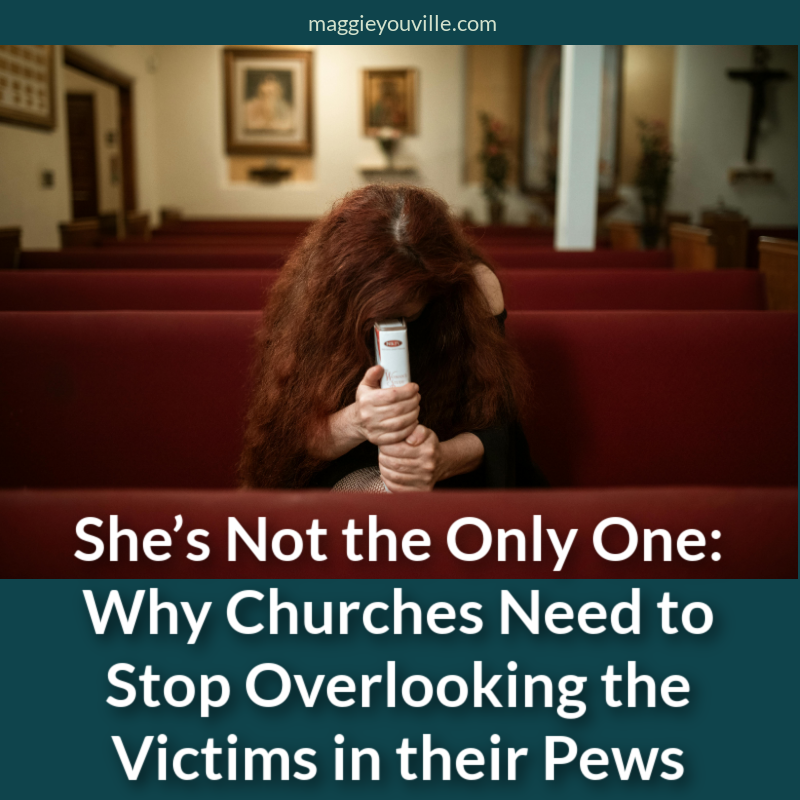Six months after my divorce from my abusive husband, I booked a weekend at a local Catholic retreat centre. In the weeks leading up to the retreat, I struggled against a reluctance to go. I’d been on retreat at this centre the year before, and that had been an amazing, healing experience for me. This year, I was wrestling with pain, anger and trauma around my annulment application and ongoing abuse from my ex-husband.
Arriving at the peaceful retreat centre, I tried to immerse myself in the calm and quiet. I shared smiles and hellos with the women I knew and appreciated the hospitality of the centre. I fought against the scattering of my thoughts, attempting to focus myself on prayer, mentally reaching out to God as I walked the halls, attended Mass, and listened to the reflections.
During one break, I followed the forest trail with a friend, filling her in on the struggles in my life and listening to hers. Our stories were different, but both of us had faced unhappiness in our marriages. She had seen my attempts to build a better marriage, seen my marriage disintegrate, supported me through those first difficult months after it happened. She felt like a sister to me, wrapping me in her compassion and understanding and prayers.
Back at the retreat centre, we settled into the living room for a talk by the hostess, Helen. A tiny nun with stylishly short grey hair, Helen perched on the edge of her chair as the mic in her hand cut in and out. She based her reflection on a familiar Bible passage and I dutifully took notes, still trying to keep my thoughts focused on God and faith and prayer rather than my kids, my ex, my finances, and the other things pressing at the back of my head.
Then Helen offered some marriage advice – stale, pat advice I’d heard over and over again as I tried to understand why my husband didn’t love me. My eyes met my friend’s across the room and we both made faces. I quickly looked down at my notebook, hoping none of the other women had noticed my eye roll. My thoughts were now churning over all the ways that advice had failed, all the reasons why it had created problems in my relationship with my ex-husband instead of helping.
At the end of the talk, I went back to my room to change my notebook for a saint biography. Later that afternoon, my friend knocked on my door. While I perched on my bed and she occupied the single chair in the room, she explained she’d talked to Helen about my situation and why the advice she’d given in the talk had hurt. She said Helen understood I’d left my abusive husband and her advice was not applicable to me, but she hadn’t wanted to give a disclaimer for fear she’d signal me out.
I stared at my friend as if she’d said Helen had three heads. “She thinks I’m the only one,” I said in disbelief. “She thinks I’m the only woman in that room dealing with an abusive relationship so she doesn’t have to change or clarify her advice.” Anger welled in me, not just that Helen wouldn’t acknowledge that her advice may be harmful, but also that she didn’t realize my situation was not isolated or unique.

The Statistics on Abuse
The statistics on abuse are frightening. Aimee Says, an AI resource for victims of domestic violence, explains, “In Canada, nearly 30% of women experience intimate partner violence in their lifetime. Additionally, about 67% of family violence victims are women and girls. These figures highlight the importance of awareness and support.”
According to Statistics Canada, “In 2018, 44% of women—who had ever been in an intimate partner relationship—reported experiencing some form of psychological, physical, or sexual violence by an intimate partner in their lifetime.” The website adds that 43% of women have experienced emotional, psychological and financial abuse and 23% of women have experienced sexual assault.
While numbers are helpful, they are also abstract. Let me try to put a face on those numbers for you. I am that 30%, that 43%, that 23%. I have experienced all those forms of abuse at the hands of my father and my husband. And I am not the only one.
Apply the Stats to Your Parish
Look around you at Mass. If there are 100 women sitting in the pews beside you, then 43 of them have experienced emotional, psychological or financial abuse from a man who says he loves them, likely the man sitting next to them, greeting you at the door and serving pancakes to you once a month. Twenty-three of those women have been sexually assaulted.
What is scarier about these numbers is that they are likely low. These numbers are “reported.” That means a woman has said she experienced emotional, psychological, financial, or sexual abuse. However, many women who are experiencing abuse don’t say that and many don’t even realize it.
My mom was married to my dad for twenty years before friends helped her see his abuse. I was married to my ex-husband for seven years before someone pointed out his abuse to me. Even after that, I spent many years trying to fix our marriage, trying to ignore his abuse, trying to tell myself he would change. And this is the story I hear from other women in abuse support groups–it took them a decade or two to realize he was abusive.

Why These Statistics Matter for the Catholic Church
Helen’s attitude is a problem because it is reflected all over the Catholic community. I have attended numerous Catholic churches across Canada and overseas. I know one church in my province that has a single mom’s support group. In one TLM parish I attended, I knew one single mom. In my current parish, there are four single moms (but no support group).
At a retreat specifically for single moms that I attended, women came from as far as 4 hours away to spend a weekend praying, learning, and connecting with other women. Many of us were still healing from divorces and annulments that happened a decade ago. We were all grateful for this retreat because there was nothing like it available in our parishes. Most of the women were the only single mom they knew in their parish. They felt lonely and isolated at church.
The Spiritual Damage of Abuse
Emotional, psychological, verbal, financial, spiritual and sexual abuse can be difficult to see and escape. It causes ongoing pain and trauma in a woman’s life that can be hard to heal from without support, therapy, and other resources. Abuse can also cause faith crises.
When God is described as a father-figure who loves me, it is hard to believe that God’s love would be different than my father’s conditional, mercurial love. My father set strict rules and issued harsh consequences, and God seems to do the same in the Old Testament. My father didn’t see or hear me, so why would God?
When Jesus is described as a bridegroom who loves me, but my own bridegroom raped me six months before our wedding and was drunk on our wedding night, it is hard to believe that Jesus is different. When my husband only helped me when he felt like doing so, and my prayers for his conversion haven’t been answered, it’s easy to think Jesus is also disinterested and expects me to help myself.
When the church is described as a family, but my family only accepts me when I act the way they want me to act, put on the role that they want me to play, and say the things they want me to say, then it is hard not to do the same at church. When everyone at church seems to have a perfect marriage and perfect children, it is hard to understand why my husband doesn’t treat me the way other husbands do, or why my husband doesn’t seem to love me. And when I try to ask for help, and am simply told to try harder, to go to confession again, to pray more, then I fall back into the roles that I have been assigned to in my family and my church and feel even more confused, lonely, and isolated.
The women in my abuse support groups are struggling in their faith. Often the Bible and the Catechism and other Church rules have been used against them. I know women who have walked away from the Catholic Church completely as a result, and other women who no longer attend Mass but are still trying to hold onto what they believe.
I am not the only one. She is not the only one. The Catholic Church needs to open her eyes and see the hurting women sitting in each pew in each church. How tragic for these women, as precious daughters of a loving God, to lose their faith because of the frailty and sin of men who fail to represent him, and because of the ignorance of other people who refuse to believe and support these victims.
Our priests and our parishes need to be the hands and feet of Jesus to these women so that they no longer feel alone and unloved.
Leave a Reply